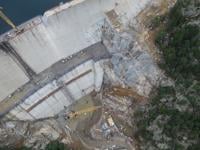Federal judge permits completion of Denver Water dam work, citing safety concerns
Although she stood by her prior determination that the project permit was unlawful, a federal judge last week decided construction on a major Denver Water infrastructure project should continue for safety reasons.
Earlier this spring, U.S. District Court Senior Judge Christine M. Arguello found that, as a result of federal law violations, the expansion of Gross Reservoir and Dam should cease permanently and any further construction on the ongoing project would stop temporarily. The pause on construction, Arguello explained, would give her time to hear from engineers and determine what work would need to occur to make the dam safe.
“Although some courts have found that the public interest in continuing a project that has already begun is stronger than the public interest in complying with (the law),” she wrote in an April 3 order, “this Court will not reward Denver Water for starting construction on the Project despite being aware of the seriousness of the environmental law challenges.”
However, on May 29, Arguello retreated from her prior bellicose tone.
“There is a risk of environmental injury and loss of human life if dam construction is halted for another two years while Denver Water re-designs the structure of the dam,” she wrote in her latest order. “Furthermore, the evidence shows that enjoining dam construction would harm Denver Water and the general public by requiring Denver Water to lay off much of its specialized workforce (which also harms those workers), as well as interfere with Denver Water’s contracts with contractors supplying materials and labor for the Project, which in turn, would significantly increase the costs.”

U.S. District Court Judge Christine M. Arguello

U.S. District Court Judge Christine M. Arguello
The upshot is that Denver Water may finish construction on its Boulder County dam, which is approximately 60% completed. However, the enlargement of the reservoir remains off-limits. In her initial decision finding the project permit unlawful, Arguello singled out the effect of expanding the reservoir separately from the dam work.
“Gross Reservoir has yet to impound excess water, which means the shoreline of the reservoir at its pre-enlargement levels has not yet changed, and the majority of the 500,000 trees remain alive,” she wrote in mid-October. “Ergo, this Court’s decision can affect said trees, water, and wildlife.”
The legal wrangling over the project has taken many turns since six environmental groups challenged Denver Water’s plan to store more water for the 1.5 million people it serves, equating to 25% of the state’s population. The selected alternative was to raise Gross Reservoir and Dam by 131 feet and enable Denver Water to capture 18,000 more acre-feet of water per year — with a single acre-foot amounting to 325,851 gallons.
Arguello originally ruled in 2021 that she did not have jurisdiction over the case, but the U.S. Court of Appeals for the 10th Circuit concluded she was mistaken and it reinstated the lawsuit.
Arguello subsequently found the U.S. Army Corps of Engineers wrongfully approved a discharge permit for the project after it improperly eliminated alternatives that avoided disturbing wetlands. Further, the Corps improperly combined two distinct goals that had the effect of steering the project toward reservoir expansion. The actions violated both the Clean Water Act and the National Environmental Policy Act.

An arial view of the Gross Reservoir and Dam construction in Boulder County as of Sept. 5, 2024. Photo courtesy of Denver Water

An arial view of the Gross Reservoir and Dam construction in Boulder County as of Sept. 5, 2024. Photo courtesy of Denver Water
From there, additional litigation occurred over Arguello’s order to halt all dam construction until she could hold a hearing about what work would be necessary to stabilize the structure. Arguello voluntarily gave Denver Water some breathing room by temporarily suspending her pause on construction. The 10th Circuit then stepped in to extend the construction period until Arguello could hear from experts at a May 6 hearing. The circuit added that it expected Arguello to modify her “total ban on continued construction.”
In her recent order, Arguello noted she heard from four experts. In part, she learned that Gross Dam is a “high hazard” structure, meaning its failure “could potentially result in loss of life and extreme property damage downstream.” The environmental groups’ expert said he had “no concern of catastrophic failure over the next couple of years,” but that there would need to be some work to keep the structure safe long-term.
Based on the evidence, Arguello believed the petitioning groups had not shown a risk of further environmental harm from allowing dam construction to proceed.
“Regrettably, environmental injury undoubtedly occurred when Denver Water moved forward with tearing down the gravity dam to build the new arch dam,” she wrote, adding that the bigger risk appeared to be the possibility the dam could fail if left in an unsafe condition.
In contrast to her recent rejection of “attempts to distinguish environmental impacts resulting from completion of the dam itself from those resulting from the entire” project, Arguello now conceded the completing the dam was “separate and distinct” from reservoir expansion.
The “public interest in the continued construction of the dam is strong and outweighs halting the Project,” she wrote.
“We’re relieved that the judge understood and appreciated the safety issues. We are relieved as well that she understood the impact to Denver Water’s customers,” Denver Water’s general counsel told The Colorado Sun on Friday.
The case is Save the Colorado et al. v. Graham et al.






